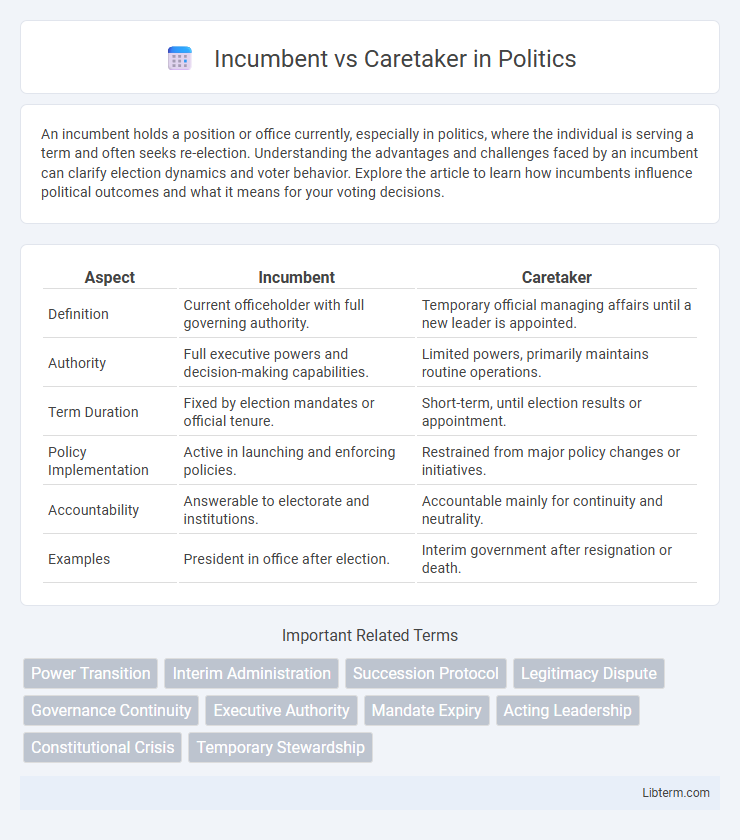An incumbent holds a position or office currently, especially in politics, where the individual is serving a term and often seeks re-election. Understanding the advantages and challenges faced by an incumbent can clarify election dynamics and voter behavior. Explore the article to learn how incumbents influence political outcomes and what it means for your voting decisions.
Table of Comparison
| Aspect | Incumbent | Caretaker |
|---|---|---|
| Definition | Current officeholder with full governing authority. | Temporary official managing affairs until a new leader is appointed. |
| Authority | Full executive powers and decision-making capabilities. | Limited powers, primarily maintains routine operations. |
| Term Duration | Fixed by election mandates or official tenure. | Short-term, until election results or appointment. |
| Policy Implementation | Active in launching and enforcing policies. | Restrained from major policy changes or initiatives. |
| Accountability | Answerable to electorate and institutions. | Accountable mainly for continuity and neutrality. |
| Examples | President in office after election. | Interim government after resignation or death. |
Understanding the Terms: Incumbent vs Caretaker
An incumbent holds an official position or office and actively performs its duties, often seeking re-election or continuation in the role. A caretaker, in contrast, temporarily manages responsibilities during transitions, without full authority to make significant decisions. Understanding the distinction clarifies political dynamics and administrative continuity during leadership changes.
Key Roles and Responsibilities
Incumbents hold official authority to make policy decisions, implement strategies, and represent their office during their elected or appointed term, ensuring continuity and long-term planning. Caretakers maintain day-to-day operations and essential services without initiating major changes or new policies, focusing on administrative stability during transitional periods. Their key responsibility is to preserve the status quo until a new incumbent assumes office, avoiding decisions that could bind future leadership.
Historical Context and Examples
Incumbent refers to the current officeholder actively serving in a political or organizational position, often leveraging the advantages of established authority and resources during elections or decision-making processes. Caretaker governments, typically appointed after the dissolution of a legislative body or during transitional periods, maintain day-to-day operations without enacting major policies, as seen in examples like Pakistan's caretaker governments between elections or Greece's interim government during economic crises. Historically, incumbents have shaped policy continuity and political strategy, whereas caretakers emphasize neutrality and stability until a new leadership is democratically established.
Legal Definitions and Framework
The legal definition of an incumbent refers to an individual currently holding office with full authority and responsibilities as prescribed by law, whereas a caretaker is a temporary officeholder with limited powers, often restricted to routine functions during transition periods. Legal frameworks typically delineate the scope of caretaker authority to prevent major policy decisions or appointments, ensuring adherence to constitutional provisions or statutes governing office succession. Jurisdictions often codify these distinctions to maintain governance continuity while safeguarding against potential abuses during periods without a formally elected or appointed official.
Authority and Limitations
An incumbent holds full authority to make decisions, implement policies, and represent the organization or government with legally binding power. A caretaker, however, operates with limited authority, primarily maintaining day-to-day functions without initiating major policy changes or long-term commitments. The limitations of a caretaker role ensure stability while preventing significant shifts in administration before a formal transition occurs.
Impact on Governance and Policy
Incumbent leaders possess established authority and resources, enabling more decisive governance and long-term policy implementation compared to caretakers, who primarily manage transitional periods with limited decision-making power. Caretakers often avoid major policy changes to maintain stability, which can slow governance responsiveness and delay reforms. The presence of an incumbent promotes continuity and strategic planning, while caretaker roles emphasize neutrality and procedural oversight during political transitions.
Transition and Succession Processes
Incumbent and caretaker roles differ significantly in transition and succession processes, where incumbents hold full authority during their tenure, ensuring continuity and implementation of long-term strategies. Caretakers manage operations temporarily, maintaining stability and preventing major policy shifts until a new leader assumes office. Effective succession planning requires clear protocols outlining the incumbent's exit and the caretaker's limited mandate to facilitate a smooth transfer of power.
Challenges and Controversies
Incumbents often face challenges related to maintaining public trust amid policy failures and controversies over entrenched power dynamics, which can lead to voter dissatisfaction and calls for reform. Caretaker governments encounter difficulties in implementing decisive actions or long-term policies due to their limited mandate and perceptions of reduced legitimacy. Both face scrutiny over transparency and accountability, with incumbents criticized for potential conflicts of interest and caretakers for their temporary, non-elected status.
Case Studies of Incumbent and Caretaker Governments
Incumbent governments, such as the U.K. Conservative Party during the 2019 general election, often leverage established political structures and ongoing policy agendas to secure electoral advantage, demonstrating the power of incumbency in maintaining voter trust. Caretaker governments, exemplified by Australia's arrangement during the 2013 federal election, operate with limited authority, focusing on routine administration while refraining from major policy decisions to ensure neutrality and fairness in the electoral process. Case studies reveal that incumbents capitalize on their active governance role, whereas caretaker administrations prioritize stability and impartiality during election periods.
Implications for Democracy and Stability
Incumbent leaders have established authority and policy continuity, which can enhance political stability and democratic legitimacy, especially when elections are free and fair. Caretaker governments, often appointed temporarily during transitions or crises, may lack full mandate authority, potentially limiting effective governance but ensuring neutrality and fairness in upcoming elections. The balance between incumbents and caretakers influences democratic consolidation, with incumbents risking power entrenchment and caretakers safeguarding procedural integrity.
Incumbent Infographic

 libterm.com
libterm.com